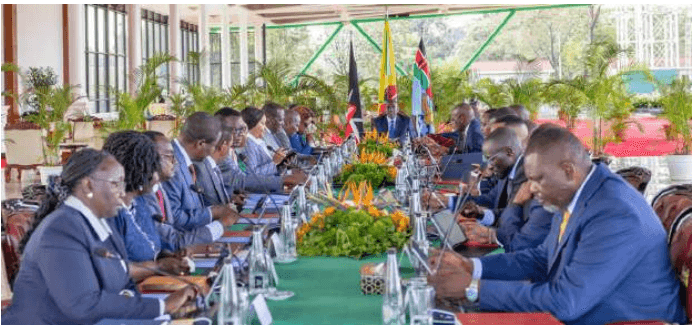Coffee farmers have called on the government to push ahead with ongoing reforms in the sector, amid concerns that ‘cartels’ are out to frustrate the process.
Brokers in the coffee value chain are said to be unsettled by the new regulations, which give farmers direct access to the auction.
Latest market trends indicate buyers are keeping off farmers’ produce availed for auction, with activities at the Nairobi Coffee Exchange remaining subdued.
This has left farmers holding on to their stocks, exposing them to losses.
Under the new reforms, coffee dealers must purchase coffee through the Nairobi Coffee Exchange auction, with Deputy President Rigathi Gachagua leading the sector’s reforms.
The government has also moved to revoke licenses of 'cartels' that have infiltrated the coffee sector in the country.
There is also a Direct Settlement System (DSS) technology that facilitates payment of coffee growers’ proceeds, as well as the recovery of other commitments the producer owes service providers.
The system is being provided by Co-operative Bank of Kenya, which is majority-owned by the cooperative societies, and has strong ties to the agricultural sector.
Licensed co-operative unions have been licensed to sell coffee directly at the NCE and overseas in what is aimed at eliminating the need for middlemen.
A number of petitions have however come up since the government moved to implement the reforms mid-this year, with a section of sector players saying the process has been rushed.
This is despite coffee reforms in the country beginning in 2016, when a taskforce was formed to look into the sector.
Sector players including marketers, buyers, farmers and the public have been part of the process to date, according to the National Coffee Cooperative Union (NACCU).
“We wonder how an activity that started in 2016, now being implemented in 2023, has been rushed. We feel this is unfair to the farmers,” NACCU chairman Francis Ngone said during a post-board meeting briefing, in Nairobi.
The union has since called on DP Gachagua and Agriculture CS Mithika Linturi not to cave into demands from dealers, and instead push on with the underway reforms, which are aimed at empowering the farmer.
NACCU is the umbrella body of secondary coffee cooperative unions in Kenya.
It advocates for the welfare of over 800,000 right holders who are the small-scale coffee farmers in the 31 coffee-growing counties.
“These people, about 75 buyers have been licensed by AFA, they have refused to come and buy our coffee, this is a way of sabotaging reforms,” Ngone said.
The volume and prices of coffee sold at the NCE have fallen sharply in recent weeks as traders and buyers kept off the market.
According to data from the NCE, auction volumes in August dropped by 95.62 percent to 192 tonnes from 4,380 tonnes at the same time last year.
“We are asking our Deputy President, to please save us because it appears that it is only through you that we are going to see the light at the end of the tunnel,” Ngone said.
CEO Lucy Murumba noted that the new regulations have come to help the farmer, increase production and get the price discovery.
According to Murumba, annual coffee production was at 130,000 metric tonnes in the past year, when the government was marketing the crop, with Kenya Planters Co-operative Union, then, as the sole miller.
It has however declined to 34,000 metric tonnes, as of 2021.
“If the farmer is being empowered to produce, process and take that coffee to the auction, and the same buyer who has been getting coffee from the farmer, now waits at the auction, where should be the problem?” Murumba posed.
She cautioned farmers could end up abandoning the cash-crop if they fail to get maximum gains.
“It is time to liberated our coffee farmers so that they are in control of both their coffee and the money, they have been growing coffee, handing over to someone else who has been in control of their coffee and the money,” she said.
DP Gachagua has however affirmed the government’s commitment saying the reforms are “unstoppable”.
Some of the policy documents that have been lined up to revive the sector include Draft Sessional Paper Number 1 of 2023 on sustainable quality coffee production for food security and wealth creation.
Others are the Coffee Bill 2023, the Draft Co-operatives Bill 2023, and the Sessional Paper no. 1 of 2020 on the National Co-operative Policy, some which are expected to become law by December.
In June this year, Gachagua read the riot act to ‘cartels’ in the sector, telling them their time to reap where they had not sown was over.
"Dignity of farmers who toil in their farms only to reap peanuts from their produce will be returned and coffee made the black gold that it was for years," Gachagua had said, during the first national Coffee Reforms Conference, in Meru Town.
The DP said farmers had been exploited for long, promising to deal with the 'cartels' and other interests by accelerating reforms in the sector.
Coffee in Kenya is produced under two farming systems; smallholder estimated at 800,000 growers and large, medium and small estates estimated at 3,000 in number.
The smallholder producers are clustered into 559 active coffee cooperative societies to enjoy economies of scale.
The cooperative societies operate 1,065 wet mills where they process and market their coffee collectively. The estates operate 2,132 wet mills of various capacities and models.
President William Ruto early this year delegated his deputy to jumpstart and fast-track the implementation of the coffee sector reforms.
















